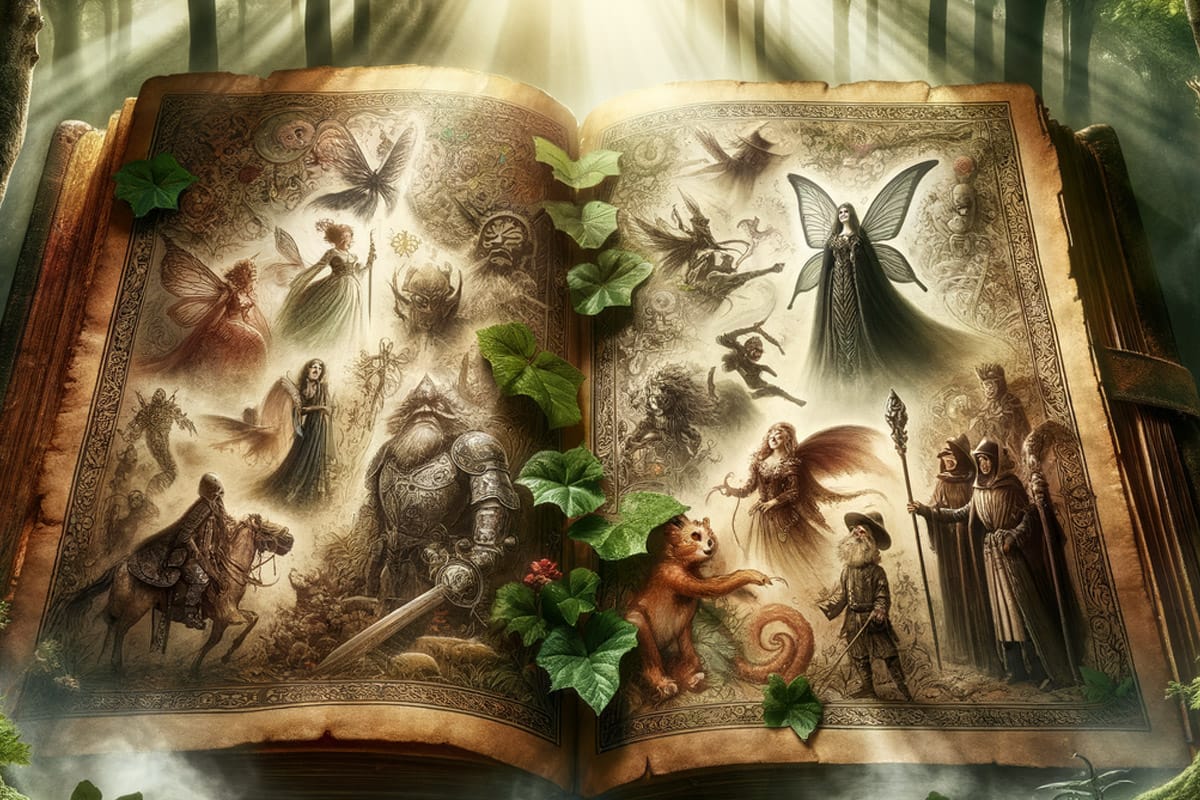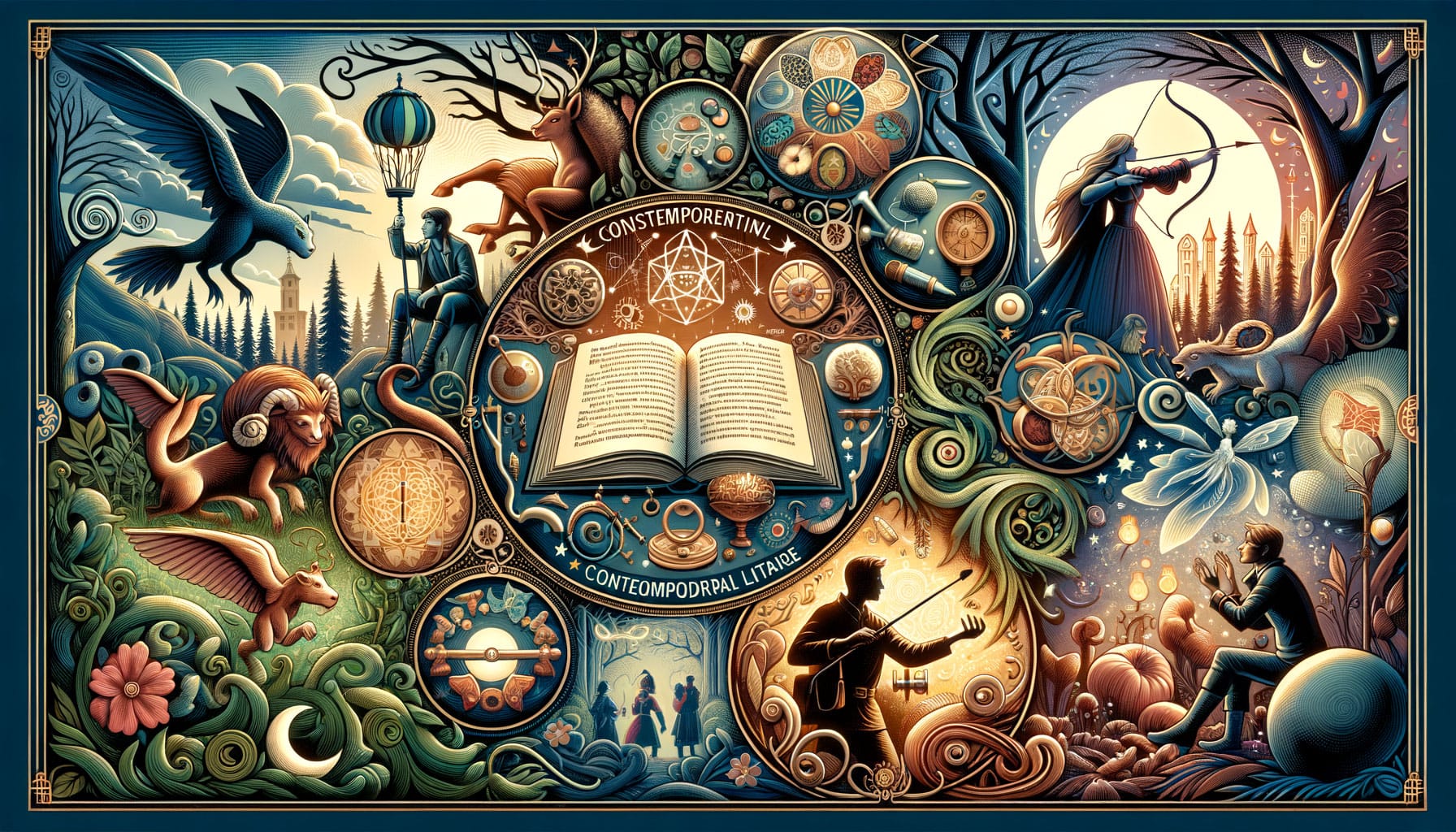Unveiling the Mystique: Exploring the Deep Roots of Folktales and Fairy Tales
Delve into the enchanting world of "Folktales and Fairy Tale Roots," exploring the tapestry of storytelling from ancient myths to modern retellings. Uncover the cultural, societal, and historical threads that weave together to form the beloved tales passed down through generations.

Tracing the Origins of Fairy Tales
Fairy tales, those captivating stories of magic and wonder, are deeply rooted in ancient mythology and storytelling traditions. These narratives have been passed down through the generations, evolving and adapting to the cultures that tell them.
The origins of these tales are not found in a single place or time but are a tapestry woven from the many threads of human history and imagination.
The evolution of folktales reflects the adaptation within oral tradition over time. As stories are told and retold, elements change to suit the audience's needs and the societal context of the time.
Characters may shift, outcomes can be altered, and settings might be adapted to familiar locales. This fluidity ensures that folktales remain relevant and engaging, as they are shaped by the very people who cherish and preserve them.
The cultural heritage preserved through the folklore embedded in fairy tales is a testament to the power of storytelling. These tales carry the values, beliefs, and lessons of the societies from which they originate.
They act as a cultural fingerprint, uniquely identifying the people and their way of life, preserving their history and morals for future generations.
Folktales serve as a foundation for the adaptation of fairy tales. The core elements of these narratives—brave heroes, malevolent villains, quests for love or riches—are universal. Yet, it is in the adaptation that these elements are given new life, tailored to the audience's contemporary needs and sensibilities, ensuring that the essence of the tale endures even as the details may change.
The Role of Mythology in Storytelling
Fairy tales embody mythology, evolving through oral tradition and storytelling. The gods, goddesses, and mythological creatures of ancient times find new life in the characters and plots of fairy tales.
These stories often served as a way to explain the unexplainable, to impart wisdom, and to entertain. Over time, the mythological roots of these tales have become intertwined with the fabric of the stories themselves.
Mythology shapes folktales, reflecting cultural heritage and societal values. The virtues extolled by a culture—bravery, honesty, loyalty—are often exemplified in the heroes of its tales. Conversely, the vices warned against—greed, envy, pride—are personified by the villains. This reflection of values helps to instill and reinforce the societal norms and expectations within the community.
The adaptation of folklore traces origins, linking mythology to modern narratives. As stories evolve, the mythological elements may become less overt, but they remain present, offering a bridge between the ancient world and our own. This connection ensures that the wisdom of the past is not lost but is instead carried forward, subtly influencing the stories we tell today.
Storytelling preserves mythology within folktales, ensuring the generational transmission of tales. The act of telling these stories is an act of preservation. As each generation passes the tales to the next, they ensure that the mythology embedded within them survives.
This continuity is a testament to the enduring appeal and importance of these narratives in human culture.

Become a custodian of cultural legacy. Sign up for our premium membership now and preserve the wisdom of yesteryear for the storytellers of tomorrow.
Become a Member!Cultural Heritage Preserved Through Tales
Fairy tales embody cultural heritage through mythological storytelling origins. Each tale is a mosaic, with pieces that represent the beliefs, history, and identity of the people who tell it. These stories are not just for entertainment; they are a means of preserving the essence of a culture's identity.
Folktales reflect the evolution of culture via oral tradition adaptations. As cultures grow and change, so too do their stories. Adapting these tales allows for the inclusion of new experiences and perspectives, ensuring that the culture's narrative remains vibrant and relevant.
Storytelling serves as a vessel for folklore's timeless preservation. Through the act of storytelling, the essence of a culture is kept alive. The tales become a medium through which the past speaks to the present, offering a sense of continuity and connection to those who came before.
The adaptation of folktales ensures the continuity of cultural heritage. As stories are adapted for new audiences, they retain the core elements that reflect the culture's heritage while also embracing the changes that come with time. This balance between preservation and adaptation is what allows folktales to endure across centuries.
The Journey from Oral Tradition to Written Word
The evolution of storytelling from oral tradition to fairy tales is a journey that spans millennia. The earliest tales were shared around fires, in homes, and at gatherings. They were not static but were instead living entities that grew and changed with each telling.
Folktales' origins rooted in cultural heritage and mythology are evident in their themes and motifs. These stories encapsulate the essence of the societies from which they spring, reflecting their fears, hopes, and values.
The transition from oral to written form has helped to preserve these narratives, offering a snapshot of the culture at a particular point in time.
The adaptation of folklore into the written word preserves cultural legacy. Writing down these stories has ensured that they are not lost to time. It has allowed scholars to study them, children to learn from them, and audiences of all ages to be enchanted by them.
Oral tradition to written fairy tales: safeguarding our collective lore. The act of recording these tales has been crucial in safeguarding our collective cultural heritage. It has provided a means for these stories to be shared widely, crossing geographic and cultural boundaries, and becoming a part of the global human experience.
Adaptation of Folktales in Modern Media
The evolution of fairy tales from oral tradition to film and other forms of media demonstrates the adaptability and resilience of these narratives. The core elements of the tales remain, but the medium through which they are told transforms, allowing for new interpretations and expressions.
The adaptation of folktales reflects changes in cultural heritage storytelling. As societies evolve, so too do the ways in which they tell stories. Film, television, and digital media offer new platforms for these ancient narratives, ensuring they continue to be relevant and accessible to modern audiences.
Mythology and folklore origins reimagined in modern media formats bring these tales into the contemporary era. The timeless themes of love, courage, and triumph over adversity are as resonant today as they were centuries ago.
By reimagining these stories, modern media breathes new life into them, ensuring that they remain a vibrant part of our cultural landscape.
Preserving folktales through innovative storytelling in today's digital world is crucial. As technology advances, the ways in which we share and consume stories also change. By embracing these new platforms, we ensure that the tales that have been passed down through generations continue to be told, enjoyed, and preserved.
Analyzing the Evolution of Storytelling
Tracing fairy tales back to mythology and oral tradition origins offers insight into the journey these narratives have taken. By examining the evolution of storytelling, we can better understand how these tales have been shaped by the cultures that tell them, and how they have, in turn, shaped those cultures.
The storytelling evolution from folktales to modern cultural heritage adaptations is a reflection of the dynamic nature of human societies. As we change, so do our stories. They adapt to our needs, our technologies, and our worldviews, ensuring that they remain an integral part of our cultural fabric.
Folklore's role in preserving fairy tales through oral tradition is foundational. It is through the act of telling these stories that they are kept alive. Oral tradition allows for a personal connection to the tales, as each storyteller brings their own voice and perspective to the narrative.
The adaptation of folktales into fairy tales reflecting societal changes is a mirror of our times. These stories offer a window into the values, concerns, and dreams of the people who tell them.
As society changes, so too do the tales, ensuring that they continue to speak to the hearts and minds of those who hear them.
Folklore Elements in Contemporary Literature
Fairy tales' evolution from oral tradition to literary works is a journey that has seen these stories take on new forms and functions. Literature has provided a means for these tales to be preserved in a more permanent form, allowing for greater analysis and appreciation.

Storytelling adapts folklore, preserving cultural heritage in modern literature. Contemporary authors draw upon the themes and motifs of traditional tales, weaving them into new narratives that resonate with today's readers.
This adaptation ensures that the wisdom and wonder of the past are not lost but are instead reinterpreted for a new generation.
Folktale origins influence contemporary literature's thematic and moral frameworks. The lessons of these ancient tales continue to inform the stories we tell today. They provide a foundation upon which modern narratives are built, ensuring that the moral and ethical considerations of the past continue to be explored and understood.
Mythology and fairy tales: intertextuality in current storytelling adaptation. The interplay between mythology, folklore, and contemporary literature is a rich field of exploration. Authors often engage with these traditional narratives, creating works that are at once familiar and new. This intertextuality enriches the literary landscape, offering readers a multilayered experience that bridges the gap between the ancient and the modern.
Understanding Folktales as a Reflection of Society
Folktales mirror societal values through mythology and oral tradition. These stories serve as a reflection of the societies that create and tell them. They offer insight into what a culture deems important, what it fears, and what it aspires to be.
The evolution of fairy tales reflects changes in cultural heritage. As societies evolve, so too do their stories. The adaptation of these tales allows for the inclusion of contemporary concerns and perspectives, ensuring that they remain relevant and resonant with each new generation.
Storytelling adapts folklore, tracing origins back to fairy tale roots. By understanding the origins of these tales, we can better appreciate their significance and the role they play in our cultural narrative. The adaptation of these stories is not just a process of change but also one of preservation and homage to the tales that have come before.
Adaptation showcases the dynamic nature of folktales in society. These stories are not static relics of the past but are instead living narratives that grow and change with us. They are a testament to the enduring power of storytelling and its ability to adapt, survive, and thrive in the ever-changing tapestry of human culture.
Embark on an adventure through the ages with our premium membership. As a member, you’ll gain exclusive access to a treasure trove of resources that unravel the mysteries of folklore and fairy tale origins, delve into the depths of mythology, and celebrate the rich mosaic of cultural heritage. Whether you're a scholar, educator, or simply a lover of lore, our curated content is designed to deepen your understanding and appreciation of these timeless tales.
Widen the window into a past that's alive, pulsating with lessons and legacies, and discover the power of stories to reflect, resonate with, and reshape society. The roots of folklore are waiting for you to explore them.
